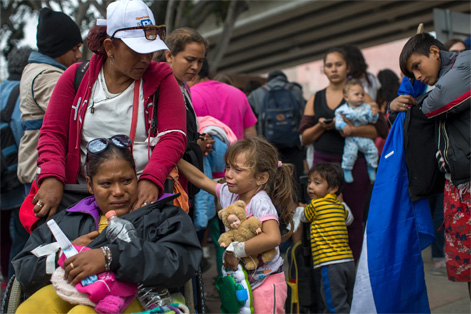|
|
|
|
|
|
 |
|
|
FILE -
Immigrant
children,
particularly
those of
school
age,
have
experienced
pain and
trauma
as a
result
of
Trump’s
rhetoric
and the
immigration
policies
it
begets.
(Getty/Sandy
Huffaker) |
| |
Immigrant
farmworkers
prepare
for
potential
deportations
as
Trump's
presidency
nears
By
Agustina
Lopez
Castro
Tell Us
USA News
Network
WASHINGTON
- As
President-elect
Donald
Trump's
inauguration
approaches,
immigrant
farmworkers
are
bracing
for
possible
mass
deportations
by
appointing
guardians
for
their
children
in case
they are
detained.
Legal
aid
organizations
report a
surge in
demand
for
their
services,
reflecting
fears
that
Trump
may act
on his
campaign
promise
to
deport
millions
of
undocumented
immigrants.
The
agricultural
sector,
heavily
dependent
on
immigrant
labor,
could
face
significant
disruptions.
The U.S.
Department
of
Agriculture
estimates
that
about
half of
the
nation's
farmworkers
lack
legal
status,
and
trade
groups
warn
that
deportations
could
threaten
the food
supply
chain.
Sarait
Martinez,
executive
director
of the
Centro
Binacional
para el
Desarrollo
Indígena
Oaxaqueño
(CBDIO),
notes
that
many
farmworkers
are
already
afraid.
Alfredo,
a
farmworker
in
Washington
State,
shares
his
concerns,
saying
that the
uncertainty
makes it
hard to
stay
motivated.
Organizations
like
CBDIO
are
holding
workshops
to help
farmworkers
prepare
for
interactions
with
immigration
authorities,
focusing
on
strategies
such as
assigning
temporary
guardianship
of
children
and
authorizing
alternate
pay
recipients.
During
Trump's
first
term,
federal
agents
conducted
raids at
processing
plants,
and the
incoming
administration
has not
ruled
out
broader
actions
against
undocumented
farmworkers.
The
agricultural
industry,
particularly
in
California,
faces
high
stakes.
With
about
400,000
farmworkers
in the
state,
75% of
whom are
undocumented,
the
potential
impact
on food
production
is
significant.
Legal
advocacy
groups
are
expanding
their
services
to
support
farmworkers,
who
often
lack
access
to legal
resources.
Patricia
Ortiz,
immigration
legal
director
at
California
Rural
Legal
Assistance,
highlights
the
vulnerability
of rural
farmworkers,
especially
those
with
U.S.-born
children.
Many
farmworkers
speak
Indigenous
languages,
adding
complexity
to
securing
documentation
for
their
children.
The
Cornell
Farmworker
Program
in New
York has
also
increased
its
workshops
to
prepare
workers
for
potential
encounters
with
immigration
officials.
|
|
|
|
|
|
|
|
|